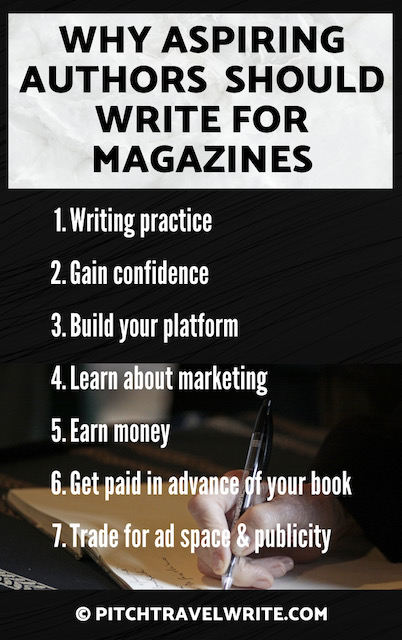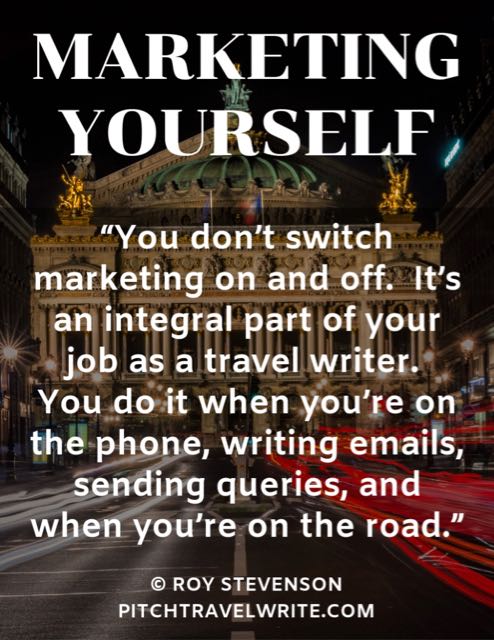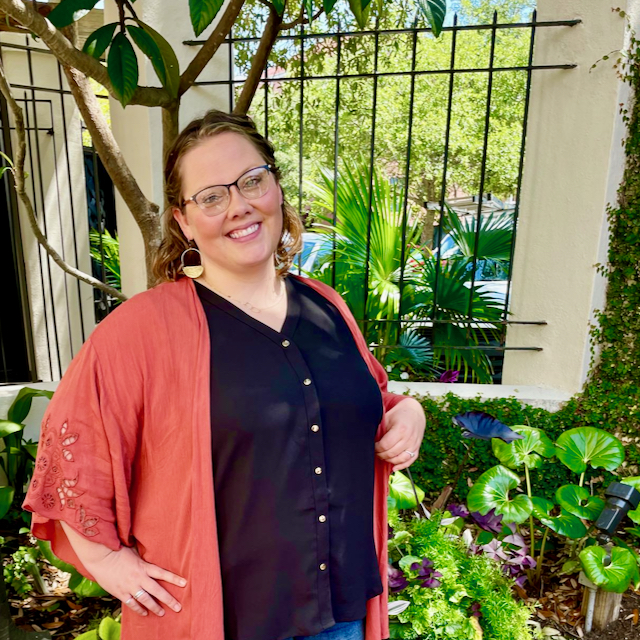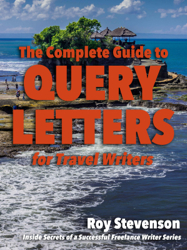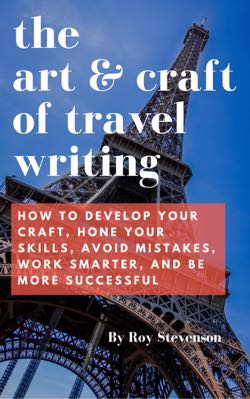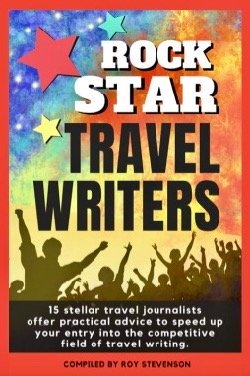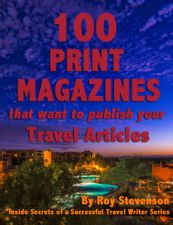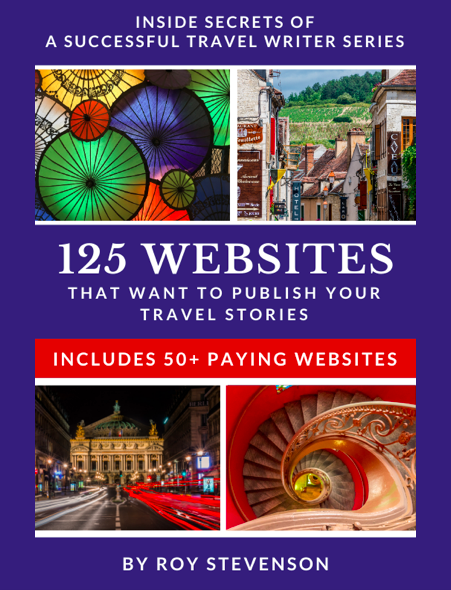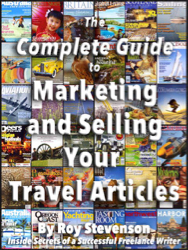- Home
- Business Basics for Travel Writers
- Freelance Writing is Good for Aspiring Authors
Freelance Writing:
Seven Reasons Aspiring Authors
Should Write for Magazines First
By Roy Stevenson
So you want to write a book? Do you think freelance writing isn't for you? I hope to dispel that notion in this post.
The vast majority of you reading this article are aspiring authors and novelists. You want to write a book, fiction or non-fiction. You've probably been led to believe this is where writers should start. Certainly there’s a romantic aura and glamour around being a published author, and everyone would dearly love to be a Stephen King or a J.K. Rowling.
While speaking at the recent Pacific Northwest Writer’s Conference here in Seattle, I was amazed to realize most of the 400 attendees were there to find out how to get their first novel published. Only a few dozen of them had ever been published in magazines or newspapers.
A large number attended my Freelance Magazine Writing presentation out of curiosity rather than any intent to learn the fine art of freelancing. As my presentation and the audience’s questions unfolded, they came to realize they were on the wrong starting line by attempting to begin their writing career with a book.
Many of them became converts to freelance writing on the spot. I reeled off reason after reason why this is where they should be starting their writing career, instead of jumping in at the deep end by writing and trying to publish a book.
If you are seriously contemplating writing a book, the reality is, you should start by honing your skills with freelance writing for magazines, newspapers, and e-zines.
With the advent of self-publishing and publish-on-demand, it has never been easier to write and publish your own book. Sadly, there’s some shockingly bad writing out there. I strongly suspect this could be remedied if aspiring authors start by writing for magazines and newspapers.
Here are seven reasons why you should start your writing career by freelancing, and racking up as many bylines as you can:
1. You can use freelance writing for magazines to practice and polish your prose
Writing a book requires the same skills that you use to write nonfiction magazine articles. You research your topic, refine your ideas, organize your information, and finally, write the piece.
Articles written for magazines have to be tight. They need to move along at a nice clip, and have lots of interesting stuff in them, to keep the reader’s attention. This is exactly how a book should read, too.
Writing for magazines is an ideal way to learn how to keep superfluous prose out of your writing. Above all, it teaches you how to avoid writing in the passive voice, and to write in the active voice.
Any serious freelancer will tell you that having a few articles you’ve slaved over knocked back to you by a magazine editor for rewriting is a valuable lesson. After you dust off your bruised ego, you get over the staggering fact that your writing needs improvement.
2. You'll gain confidence when you get published
I’ve had nearly 1000 articles accepted for publication since I started freelance writing. Have I gained self-confidence with this? You bet I have!
I’ve had many great experiences with editors that have affirmed my writing abilities. There’s no better confidence booster than having an editor compliment you on your work. Even more exciting, when editors like your work they often ask you to write specific articles for them or encourage you to pitch more story ideas. That builds confidence, too.
3. Freelance writing gets your name out there and helps you build your platform
Writing articles for magazines helps you establish your reputation and builds your credibility. This is your marketing platform — a base from which you can launch your book.
I can’t over-emphasize the importance of
establishing your marketing platform before you write and sell a book. Freelance writing helps you do that.
As
a freelancer you make a lot of contacts that helps
the publisher market your book. If you self-publish your book,
you’ll have lots of magazine and newspaper contacts to tickle for some
publicity. Write an article and exchange it for an ad, for example.
Once you’re a well-published freelance magazine writer, book agents will be far more receptive to your pitch for your book. I’d also bet they’ll pay you a larger advance than if you were not previously published. In any case, you’re certainly in a better position to bargain when you have bylines to your name.
4. Freelance writing teaches you about the writing and sales & marketing processes
That big step up to writing and publishing your book will not seem so intimidating after all the writing and marketing you’ve done by freelance writing. Writing your book proposal is simply an extended, more detailed version of the query letters that you regularly send out to magazine editors. You learn how to pitch.
Putting a book proposal together takes time, but your experience writing query letters to magazine editors will hone these skills. Your proposal will stand out above the rank and file because you’ve learned to keep your queries concise, engaging, and attention grabbing.
5. You can get paid for your articles and turn them into chapters in your book
Not only can you sell an article once, you can sell it multiple times to non-overlapping markets.
I’m a big believer in wringing as much use as possible from a magazine article. I’ve resold some articles a dozen times, and made over $3,000 from each of them. In all likelihood you’ll make more money in a year of freelance writing than from writing your first novel -- unless it’s a blockbuster, of course.
Most first time novelist don't make much
money - that's a well known fact. You’ll make far more money selling
your articles to
magazines. Some authors write an article and then make it a chapter in
their book. They do this with each topic meant for their book - write an
article, sell it, then make it a chapter. Essentially they get paid in
advance, by magazines, for writing their book.
Previously unpublished authors only receive small advances. A good advance for a first time author is only $3,000! Let’s say your book has 15 chapters. If you write 15 articles (for each chapter topic), you'll earn between $200-$500 for each. So the very least you’ll make is $3,000 selling the chapters as individual articles, and probably more than that. And, if you resell your articles, you’ll make far in excess of that.
You’ll earn the same amount -- or more -- writing a few magazine articles as you can
from an advance for your book. Then, if you get an advance for the whole book you'll feel elated because you got paid twice!
6. You'll get a stamp of approval for your writing in advance of your book
It’s nice to know your articles, which will eventually be the skeletons for your book chapters, have already been “proven” out there.
In other
words, the act of freelance writing has uncovered the fact that editors think your work is suitable for publication -- meaning it's engaging to readers and well-written.
7. You can trade ad space and publicity for articles
Once you’ve established yourself with several magazine editors and become one of their “regulars”, you can usually trade future articles for ad space. Editors by far prefer to give you ad space in their magazines rather than forking out cash for your article.
Those same
editors might be happy to do a review of your book, giving you more publicity. Be sure and ask them.
Consider this: if you don’t have the patience to spend a day or two writing an 1800 word article for a magazine, what chance do you have completing a 200 – 300 page book?
Writing shorter articles gives you room to practice. Putting a book chapter together will be easy — it’s just an enhanced article, or a series of short articles.
Writing your own book and freelance writing should be seen as synergistic enterprises, instead of separate tasks. The savvy freelancer should always be writing magazine articles with the idea of eventually publishing them in book form.
I've created a dozen self-published eBooks based on articles I've written for print magazines, for the internet, for editorials and even for social media. And, every year we make several thousand dollars selling these ebooks -- for work I put in years ago. You can do the same thing -- if you have the vision.
My writing has also improved tremendously by writing freelance articles. I write faster and more clearly than when I started out — big advantages for the aspiring author.
I’m also far more confident in my writing and
marketing abilities now that I can visit my local magazine
rack every month and find three or four magazines with my work in them.
And all the query letters I’ve sent out have been great practice for
book proposals, if I were to look for a publisher.
And once you're a published author, editors will be more likely to go for your magazine article pitches, so it works both ways.
Many freelance magazine writers eventually make the leap from selling articles to writing a book. Freelancers take this step because they’ve learned a lot about their chosen area of writing and developed a lot of expertise. A book is a bigger medium for the freelancer with a vision.
If publishing a book is on your dream list, make it a reality by starting with freelancing. You'll reap many advantages while you're on the journey - financially and for your reputation. And a book is a very satisfying culmination of months or years of writing those articles.

Roy Stevenson is a professional travel writer and the author of www.PitchTravelWrite.com. Over the past ten years, he’s had more than 1000 articles published in 200 magazines, trade and specialty journals, in-flights, on-boards, blogs and websites and has traveled on assignment around the U.S. and to dozens of international destinations.
IF YOU ENJOYED THIS POST, GET UPDATES. IT'S FREE.
